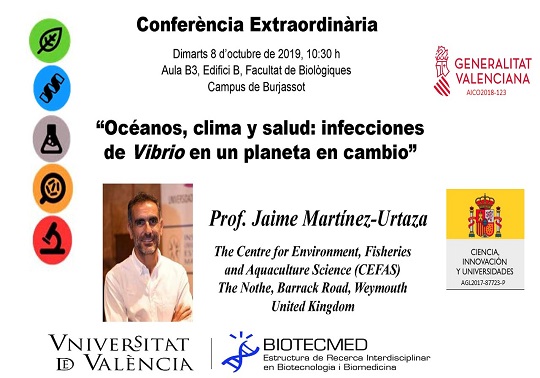
On Tuesday, October 8 at 10:30, an Extraordinary Conference will take place in classroom B3 of the Faculty of Biology (Burjassot Campus) within the Conference Series of the BioTecMed ERI entitled “Océanos, clima y salud: infecciones de Vibrio en un planeta en cambio" (Oceans, Climate and Health: Vibrio infections in a planet instead). The conference will focus on the influence of climate change on infectious diseases caused by marine bacteria of the genus Vibrio. The conference will be given by Professor Jaime Martínez-Urtaza, Senior Researcher at the "Center for Environment, Fisheries and Aquaculture Science (CEFAS) (Weymouth. RU). Professor Jaime Martínez-Urtaza works on different aspects related to food security and the epidemiology of waterborne and food diseases. He has previously worked as a professor at the University of Santiago de Compostela, as an expert researcher in food and waterborne diseases at the European Center for Disease Control (Sweden) and as a professor-researcher, expert in genomics and phylogenomics at the “Milner Center for Evolution” from the University of Bath (United Kingdom). He is an honorary professor at the University of Exeter (United Kingdom) and visiting professor at the University of Southampton (United Kingdom), the Universidad de la Frontera (Chile) and at the Food and Development Research Center-CIAD (Mexico). He is also a scientific advisor to the National Institute of Health of Peru and an active member of the ECDC European Environment and Epidemiology (E3) Network and the international initiative The Lancet Countdown on Health and Climate Change.
His work covers different aspects of molecular epidemiology and the effects of climate on infectious diseases with a particular interest in the study of foodborne and waterborne diseases. A central theme in his work is the fusion of different scientific disciplines such as molecular biology, microbiology, population genetics, oceanography, climate sciences and epidemiology, to decipher the dynamics of pollution in the environment and in the onset of diseases. During the last years he has dedicated a good part of his activity to the application of advanced genomic tools to identify new aspects in the evolution and dispersion of human pathogenic bacteria with a particular interest in the reconstruction of the evolutionary history and the dissemination of human pathogens in connection with natural events or associated with human activity. His work has been published in magazines such as New England Journal of Medicine, Lancet, Nature Climate Change and Nature Microbiology.
ABSTRACT
During the last years there has been an intense debate about climate change at a social, political and scientific level, maintaining the discussion in terms of the future. Throughout this process we have been able to observe how this futuristic became a tangible reality that is affecting our daily lives. The dimension of the changes that are being observed are exceeding all the forecasts that had been established, and future projections do not provide better prospects. In this context, the oceans have been seriously affected earning more than 90% of total warming. Today we have hotter, less salty seas and more changing ocean patterns. Given this new situation, an organism has been especially favored: Vibrio. Due to their ecological preferences for hot waters and low salinity, these bacteria are expanding their geographic range reaching areas close to the Arctic circle, something unthinkable a few years ago for a bacterium traditionally associated with tropical areas. But in addition, the genus Vibrio includes the three most important human pathogens of marine origin worldwide: Vibrio cholerae, V. parahaemolyticus and V. vulnificus. The geographic and demographic expansion of these organisms generated by climate change has resulted in a parallel increase in the number of infections globally, with cases emerging in areas where these pathogens had never been detected before. The causes of this increase are complex and mostly multifactorial, but in recent years there have been decisive advances to bring new light to these processes. The development of climate sciences in the last decade, mainly thanks to the contribution of satellite environmental monitoring, associated with the application of genomic tools, has generated a new analytical context that is revolutionizing Vibrio studies and is changing our vision on epidemic dynamics of these diseases and the role of the oceans in the dispersal of these organisms. Thanks to these advances, tools have been developed to visualize the ecological conditions associated with the risk of Vibrio almost in real time, and it is possible to trace the dispersion of the epidemic clones of these pathogens with unimaginable accuracy a few years ago. This new analytical framework that combines satellite environmental data with the accuracy of genomics is contributing to the development of new global coverage epidemiological monitoring systems that are publicly accessible through the web and are currently applied by epidemiologists and public health experts to mitigate the impact of these diseases on a planet under the effects of climate change.
This conference has been sponsored by the AICO2018-123 projects of the Generalitat Valenciana and AGL2017-87723-P of the Ministerio de Ciencia, Innovación y Universidades (Ministry of Science, Innovation and Universities).
Date 8 october 2019 at 10:31 to 12:00. Tuesday.
B3 Classroom, Building B, Faculty of Biology, Burjassot Campus
ERI BioTecMed.
Contact carmen.amaro@uv.es









